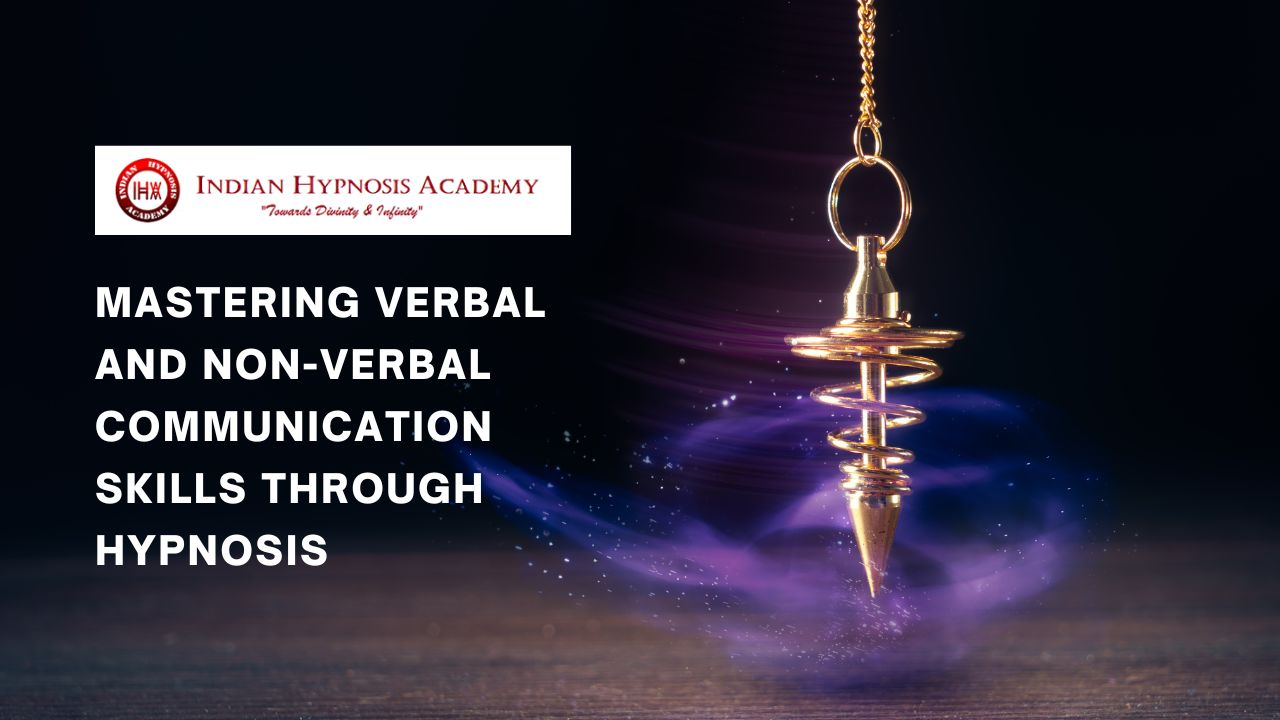Welcome to the fascinating world of communication! Whether you realize it or not, every single day we engage in countless interactions that shape our relationships, influence our decisions, and impact our lives. From a simple smile to an eloquent speech, communication is what connects us as human beings.
But have you ever stopped to think about how much power lies within your ability to communicate effectively? It’s not just about the words we speak; it’s also about the subtle cues we give off through body language and tone of voice. Verbal and non-verbal communication go hand in hand, creating a tapestry of messages that can either strengthen connections or lead to misunderstandings.
In this blog post, we’re going on a journey deep into the realm of communication skills. We’ll explore common challenges faced by many individuals when it comes to expressing themselves clearly and authentically. And most importantly, we’ll uncover how hypnosis can be a powerful tool for mastering both verbal and non-verbal communication.
So get ready to unlock new levels of understanding and connection as we dive into the science behind hypnosis and discover practical techniques for enhancing your communication skills. Are you intrigued? Then let’s begin this transformative journey together!
Understanding the Power of Communication
Communication is a fundamental aspect of human existence. It allows us to express our thoughts, emotions, and desires to others. But communication is not just about conveying information; it holds the power to shape relationships, influence decisions, and create understanding.
Think about how a heartfelt conversation can mend a broken relationship or how a well-delivered presentation can inspire an audience. These instances demonstrate the immense power that effective communication possesses. When we communicate effectively, we connect on a deeper level with those around us.
But it’s important to recognize that communication goes beyond mere words. Non-verbal cues such as facial expressions, body language, and tone of voice play crucial roles in conveying messages accurately. They provide additional layers of meaning that enhance our verbal communication.
Furthermore, effective communication fosters empathy by allowing us to understand others’ perspectives and experiences better. It bridges gaps in understanding and creates harmony among individuals or groups who may have differing viewpoints.
By mastering the art of effective communication, we gain the ability to build strong relationships based on trust and respect. We become better listeners who genuinely hear what others are saying rather than simply waiting for our turn to speak.
Understanding the power of communication enables us to navigate both personal and professional spheres with confidence and grace. It empowers us not only as individuals but also as leaders who can inspire positive change through their words and actions.
So let’s dive deeper into verbal and non-verbal communication skills while exploring how hypnosis can help unlock your full potential in this essential aspect of life!
The Role of Verbal and Non-Verbal Communication in Daily Interactions
Verbal and non-verbal communication are two essential components of our daily interactions. They work hand in hand to convey messages, express emotions, and establish connections with others.
When it comes to verbal communication, we rely on words, tone of voice, and language to articulate our thoughts and ideas. It allows us to engage in conversations, share information, ask questions, and make ourselves understood. Whether we’re speaking face-to-face or using digital platforms like phone calls or video chats, the power of words can shape how others perceive us.
On the other hand, non-verbal communication encompasses body language cues such as facial expressions, gestures, posture, eye contact – even silence speaks volumes! These subtle signals often reveal more about our true feelings and intentions than mere words alone. A warm smile can instantly put someone at ease; a firm handshake conveys confidence; avoiding eye contact might indicate discomfort.
In daily interactions – be it personal relationships or professional settings – both verbal and non-verbal elements play crucial roles in effective communication. They create a complete picture that helps us interpret others’ messages accurately while conveying our own thoughts clearly.
Understanding the importance of both forms of communication is key to building strong connections with others. By mastering these skills through hypnosis techniques specifically designed for improving verbal expression and non-verbal cues interpretation enhances one’s ability to connect deeply with people around them.
So let’s explore the various challenges individuals face when communicating verbally or non-verbally on a daily basis – from social anxiety hindering public speaking skills to misinterpreting subtle gestures –and delve into how hypnosis can help overcome these obstacles effectively!
Common Communication Challenges and How Hypnosis Can Help
Communication is a fundamental aspect of human interaction, but it’s not always smooth sailing. Many individuals face common challenges when trying to effectively convey their thoughts and feelings to others. These challenges can include difficulties expressing oneself clearly, misinterpreting or misunderstanding messages, and struggles with active listening.
Fortunately, hypnosis offers a powerful tool for overcoming these communication hurdles. By accessing the subconscious mind through relaxation techniques and guided suggestions, hypnosis can help individuals address underlying issues that may be hindering their communication skills.
One common challenge is anxiety or nervousness in social situations. Hypnosis can help alleviate this by reducing stress levels and boosting self-confidence. Through deep relaxation and positive affirmations, individuals can develop a sense of calmness and assertiveness when communicating with others.
Another obstacle many people face is difficulty in expressing themselves articulately or finding the right words to convey their thoughts effectively. Hypnosis can enhance linguistic abilities by tapping into the creative potential of the subconscious mind. By visualizing successful communication scenarios during hypnotic sessions, individuals can improve their vocabulary, fluency, and overall verbal expression.
Non-verbal communication cues such as body language are equally important in conveying messages accurately; however, some people struggle with interpreting or displaying these cues appropriately. Hypnosis can help heighten awareness of non-verbal signals by enhancing observation skills and increasing sensitivity to subtle gestures or facial expressions.
Active listening is another vital component of effective communication that often gets overlooked amidst distractions or preoccupations. With hypnosis techniques like suggestion therapy or guided imagery exercises focused on concentration and attentiveness, individuals can cultivate better listening habits which lead to improved understanding and more meaningful interactions.
Breaking Down the Science Behind Hypnosis for Improved Communication
Hypnosis has long been a topic of fascination and curiosity. Often depicted in movies and television shows as a mysterious tool, it is important to understand that hypnosis is indeed grounded in science. By tapping into the power of the subconscious mind, hypnosis can help individuals improve their communication skills.
So how does it work? Hypnosis involves guiding an individual into a deeply relaxed state where they become more open to suggestion. In this state, the conscious mind takes a backseat while the subconscious mind becomes more receptive to positive suggestions and new patterns of behavior.
When it comes to communication, hypnosis can be used to address various challenges. For example, if someone struggles with public speaking or social anxiety, hypnosis can help alleviate those fears by reprogramming negative thought patterns and boosting confidence levels.
Furthermore, through visualization techniques during hypnotic sessions, individuals can enhance their non-verbal communication skills. They can visualize themselves being confident speakers or successfully conveying their thoughts through body language.
The effectiveness of hypnosis lies in its ability to bypass any internal barriers that may hinder effective communication. It allows individuals to tap into their true potential by rewiring negative beliefs and replacing them with positive affirmations.
It’s worth noting that results may vary from person to person when it comes to using hypnotherapy for improved communication skills. However, many people have reported significant improvements after undergoing regular sessions with professional hypnotists or utilizing self-hypnosis techniques at home.
Understanding the science behind hypnosis enables us to appreciate its potential for enhancing verbal and non-verbal communication skills. By addressing deep-rooted issues at the subconscious level and introducing positive suggestions during hypnotic states, individuals can experience profound transformations in their ability to communicate effectively. So why not explore this powerful tool and unlock your full communicative potential? Improve your communication with Hypnosis today!
Techniques for Enhancing Verbal and Non-Verbal Communication Skills with Hypnosis
When it comes to improving our communication skills, hypnosis can be a powerful tool. Through the use of specific techniques, hypnosis can help enhance both verbal and non-verbal communication abilities. Here are some effective techniques that can be used to achieve this:
- Visualization: By using guided imagery during hypnosis sessions, individuals can visualize themselves engaging in confident and effective communication. This helps build positive associations with communication and creates a mental blueprint for success.
- Anchoring: Hypnosis allows individuals to create anchors or triggers that help them access desired states of communication at will. For example, by associating a physical gesture like tapping their fingers together with confidence in speaking, they can activate that feeling whenever needed.
- Subliminal messaging: During hypnotic trance states, suggestions related to improved communication skills can be embedded into the subconscious mind. These messages bypass conscious resistance and work on a deep level to rewire patterns of thinking and behavior.
- Relaxation techniques: Hypnosis induces deep relaxation, reducing anxiety and stress around communicating effectively. When we are relaxed, our words flow more smoothly and our body language becomes more open and welcoming.
- Role-playing: Through hypnotherapy sessions, individuals can engage in imaginary scenarios where they practice different aspects of verbal and non-verbal communication with guidance from the therapist.
By incorporating these techniques into regular hypnotherapy sessions focused on enhancing communication skills, individuals have the opportunity to transform their ability to connect with others on both verbal and non-verbal levels.
Real-Life Success Stories: How Hypnosis has Transformed Communication for Individuals and Teams
Hypnosis is not just a mystical concept reserved for stage shows or Hollywood movies. It has real-life applications that can profoundly impact our daily lives, including communication skills. Many individuals and teams have experienced incredible transformations in their ability to effectively communicate through the power of hypnosis.
One success story involves Sarah, who struggled with public speaking her entire life. Whenever she had to present in front of a crowd, her anxiety would take over and she would stumble over her words. But after undergoing hypnosis sessions focused on confidence and self-assurance, Sarah was able to conquer her fear of public speaking. She now delivers presentations with ease and engages her audience effortlessly.
Another example is Mark, a team leader who faced challenges in connecting with his employees. Despite his best intentions, he often came across as distant or unapproachable. Through hypnosis sessions targeting empathy and rapport building skills, Mark learned to tune into non-verbal cues and communicate more effectively on an emotional level. This transformation resulted in improved relationships within his team and increased productivity.
These success stories highlight the potential of hypnosis as a powerful tool for enhancing both verbal and non-verbal communication skills. By addressing underlying issues such as anxiety or lack of self-confidence, individuals can overcome barriers that hinder effective communication.
Moreover, hypnosis helps individuals tap into their subconscious minds where deeply ingrained patterns of communication reside. By accessing this level of awareness through guided relaxation techniques during hypnotherapy sessions, individuals gain insights into their own communication styles and learn how to make positive changes.
In addition to individual transformations, hypnosis also offers benefits at the team level by improving overall dynamics among members. Team-building exercises involving group trance states allow participants to develop trust and open channels of effective communication without judgment or criticism.
By harnessing the power of suggestion during these group sessions under the guidance of a skilled hypnotist, teams can break down communication barriers and foster a more collaborative and cohesive environment
Conclusion: Taking Control of Your Communication Skills through Hypnosis
In today’s fast-paced and interconnected world, effective communication skills are more important than ever. Whether it is in our personal relationships or professional endeavors, the ability to convey our thoughts, feelings, and ideas with clarity and confidence can greatly impact our success and happiness.
Through this article, we have explored the power of communication and the role that both verbal and non-verbal cues play in daily interactions. We have also discussed common challenges that many individuals face when it comes to communication.
Fortunately, there is a powerful tool available for those looking to enhance their communication skills – hypnosis. By tapping into the subconscious mind through hypnotic techniques, we can unlock hidden potential within ourselves and transform how we communicate with others.
Hypnosis works by bypassing our conscious filters and accessing deeper levels of awareness where positive suggestions can be implanted. This allows us to address any underlying issues or limiting beliefs that may be hindering effective communication. With regular practice, these new patterns of thought become ingrained in our subconscious mind, leading to improved verbal fluency, enhanced body language awareness, increased empathy, active listening skills – all crucial elements for successful communication.
By incorporating hypnosis into your life as a means of self-improvement , you have the opportunity to take control of your own destiny when it comes to communicating effectively. Through various techniques such as guided visualizations , affirmations , relaxation exercises , you can gradually reprogram your mind for better interpersonal connections .
Real-life success stories serve as a testament to how hypnosis has transformed individual lives as well as team dynamics . People who previously struggled with public speaking now confidently present their ideas before large audiences; couples on the brink of divorce rediscover love by improving their dialogue; teams achieve greater synergy due to open lines of communication fostered through group hypnotherapy sessions.
It’s important to remember that mastering verbal and non-verbal communication skills takes time and practice. Hypnosis can be a valuable tool in this journey, but it is not a quick fix. With consistent effort and commitment, you can cultivate effective communication skills that will benefit you in all areas of your life. So why wait? Take control of your communication skills today through the power of hypnosis.



